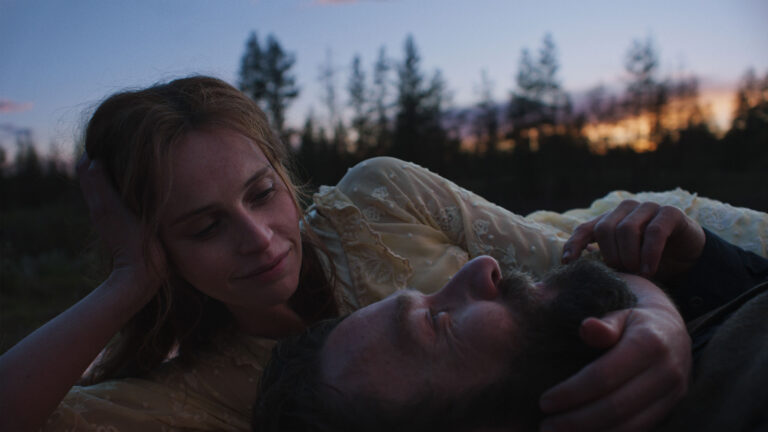In Train Dreams, director Clint Bentley delivers a striking adaptation of Denis Johnson’s novella, crafting a meditation on fate and grief, and how the passage of time can alter our perception of such things. Reuniting with his Jockey and Sing Sing collaborator Greg Kwedar to co-write the screenplay, Bentley constructs a film that explores both the physical toll of labor and the emotional burden of memory and loss.
The film follows Robert Grainier (Joel Edgerton, in possibly the best performance of his career), a logger and railroad worker making his way through the Pacific Northwest at the dawn of modern industry. Edgerton imbues Robert with a rugged stoicism, conveying emotion through movements and expressions rather than dialogue; indeed, there are long stretches of the film where no words are spoken, other than the occasional voiceover narration. Robert’s life is shaped by hard labor and weeks away from home, a necessary sacrifice to craft a future for himself and his wife, Gladys (Felicity Jones). The couple builds a home on a small patch of land in the wilderness, raising their daughter in what briefly feels like a tranquil existence, but Train Dreams makes clear from the start that no peace is permanent. Economic pressures, personal tragedy, and the relentless push of industrial progress continually reshape Robert’s world, often leaving him unmoored and isolated.
Cinematographer Adolpho Veloso captures the vastness of the American frontier with a painterly eye, using natural light to evoke a sense of time and place. Landscapes are breathtaking, even within the constraints of the film’s 3:2 ratio, and the film’s dreamlike quality is further enhanced by a beautiful score from Bryce Dessner. Many films (and filmmakers) have sought to romanticize the era, but Bentley avoids this trend, instead portraying the harsh realities of labor and the loneliness that accompanies a life of work and survival. Likewise, the film doesn’t shy away from the racism embedded in early American expansion; the brutal murder of a Chinese immigrant with whom Robert works on a railroad crew hangs over him like a phantom.
Superstition and fate weave their way through Robert’s life, most notably in the presence of Arn Peeples (William H. Macy), an older laborer quite adept at sidestepping the more grueling tasks, whose ominous warnings about the toll of industrialism on the natural world are frequently dismissed by the younger generation. Only Robert seems to lends any credence to Arn’s observations, pondering whether his own misfortunes might be a form of retribution by forces beyond his control; he’s haunted by the passage of time and a world that seems indifferent to his struggles.
Train Dreams is less a conventional narrative and more a series of moments that combine into something profound. It resists sentimentality while remaining deeply emotional, depicting a man’s life not as a collection of milestones but as a series of fleeting experiences. Edgerton carries nearly every frame, his face a canvas of suppressed emotions and quiet revelations, and in a world that demands resilience, his moments of vulnerability become all the more affecting. It’s a film that feels beautiful despite a deep, almost crushing melancholy, capturing the intimacy of a single life amid the vastness of history.
Find more of our Sundance 2025 coverage at this link.

